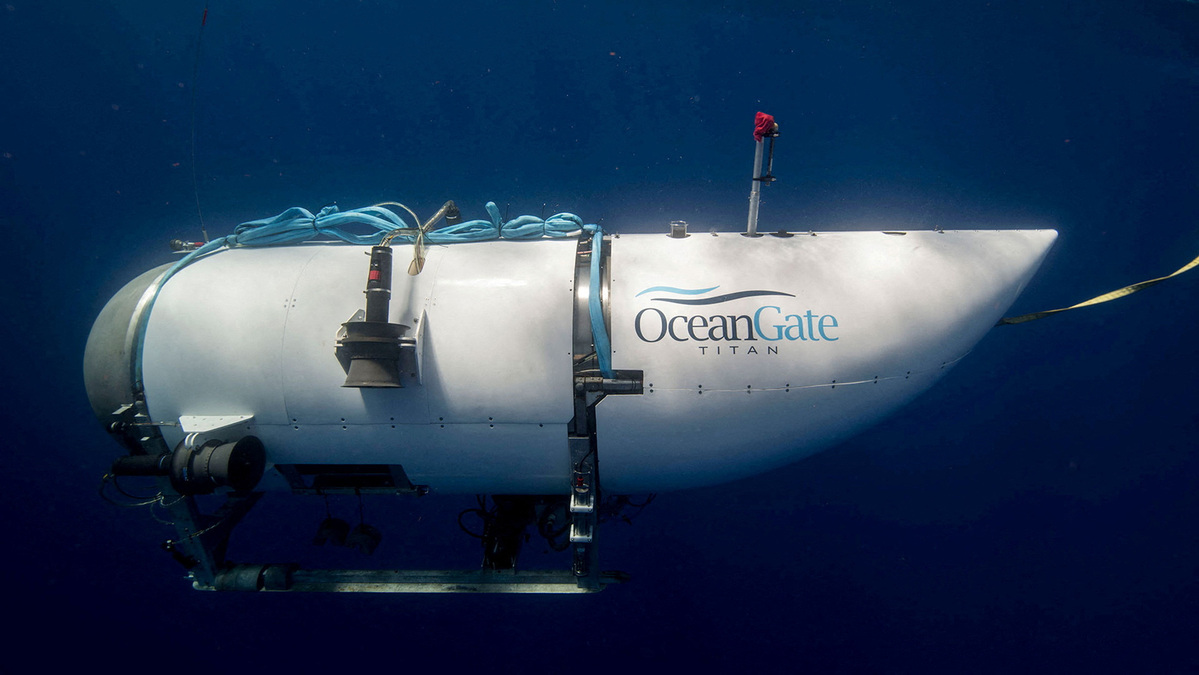All 5 dead in deep-sea sub implosion
chinadaily.com.cn | Updated: 2023-06-23 03:57

Tragedy calls for more attention to safety issues in such high-risk expeditions
NORFOLK, Virginia/BOSTON — A deep-sea submersible carrying five people on a voyage to the century-old wreck of the Titanic was found in pieces from a "catastrophic implosion" that killed everyone aboard, the United States Coast Guard said on Thursday, bringing a tragic end to a five-day saga that included an urgent around-the-clock search and a worldwide vigil for the vessel known as the Titan.
A robotic diving vehicle deployed from a Canadian ship discovered a debris field from the submersible Titan on Thursday morning on the seabed some 488 meters from the bow of the Titanic, 4 kilometers beneath the surface, US Coast Guard Rear Admiral John Mauger told reporters.
The Titan, operated by OceanGate Expeditions, had been missing since it lost contact with its surface support ship on Sunday morning about 105 minutes into what should have been a two-hour dive to the world's most famous shipwreck.
Five major fragments of the 6.7-meter submersible were located in the debris field left from its disintegration, including the vessel's tail cone and two sections of the pressure hull, Coast Guard officials said. No mention was made of whether human remains were sighted.
"The debris field here is consistent with a catastrophic implosion of the vehicle," Mauger said.
Even before the Coast Guard's news conference, OceanGate issued a statement saying there were no survivors among the five men aboard the Titan, including the company's founder, Stockton Rush, who was piloting the Titan.
The four others were British billionaire and explorer Hamish Harding, 58; Pakistani-born business owner Shahzada Dawood, 48, and his 19-year-old son, Suleman, both British citizens; and French oceanographer and renowned Titanic expert Paul-Henri Nargeolet, 77, who had visited the wreck dozens of times.
Rescue teams from several countries had spent days scanning thousands of square kilometers of open seas with planes and ships for any sign of the Titan.
Intense worldwide media coverage of the search largely overshadowed the aftermath of a far greater maritime disaster stemming from the wreck of a migrant vessel off the coast of Greece last week, killing hundreds of people.
The search for Titan had grown increasingly desperate on Thursday, when the submersible's estimated 96-hour air supply had been expected to run out if it were still intact, a countdown that proved irrelevant.
The undersea expedition to the Titanic wreck, which OceanGate has been operating since 2021, cost $250,000 per person. At least 46 people successfully traveled on OceanGate's submersible to the Titanic wreck site in 2021 and 2022.
Tighter regulations
Experts expect the US will respond with tighter regulations given the loss of life and the millions of dollars spent by the Coast Guard. But questions about the submersible's safety were raised by both by a former company employee and former passengers.
David Lochridge, OceanGate's former director of marine operations, argued in 2018 that the method the company devised for ensuring the soundness of the hull — relying on acoustic monitoring that could detect cracks and pops as the hull strained under pressure — was inadequate and could "subject passengers to potential extreme danger in an experimental submersible."
One of the company's first customers likened a dive he made to the site two years ago to a suicide mission.
"Imagine a metal tube a few meters long with a sheet of metal for a floor. You can't stand. You can't kneel. Everyone is sitting close to or on top of each other," said Arthur Loibl, a retired business owner and adventurer from Germany. "You can't be claustrophobic."
Nicolai Roterman, a deep-sea ecologist and lecturer in marine biology at the University of Portsmouth, England, said the disappearance of the Titan highlights the dangers and unknowns of deep-sea tourism.
"Even the most reliable technology can fail, and therefore accidents will happen. With the growth in deep-sea tourism, we must expect more incidents like this."
AGENCIES—XINHUA
























